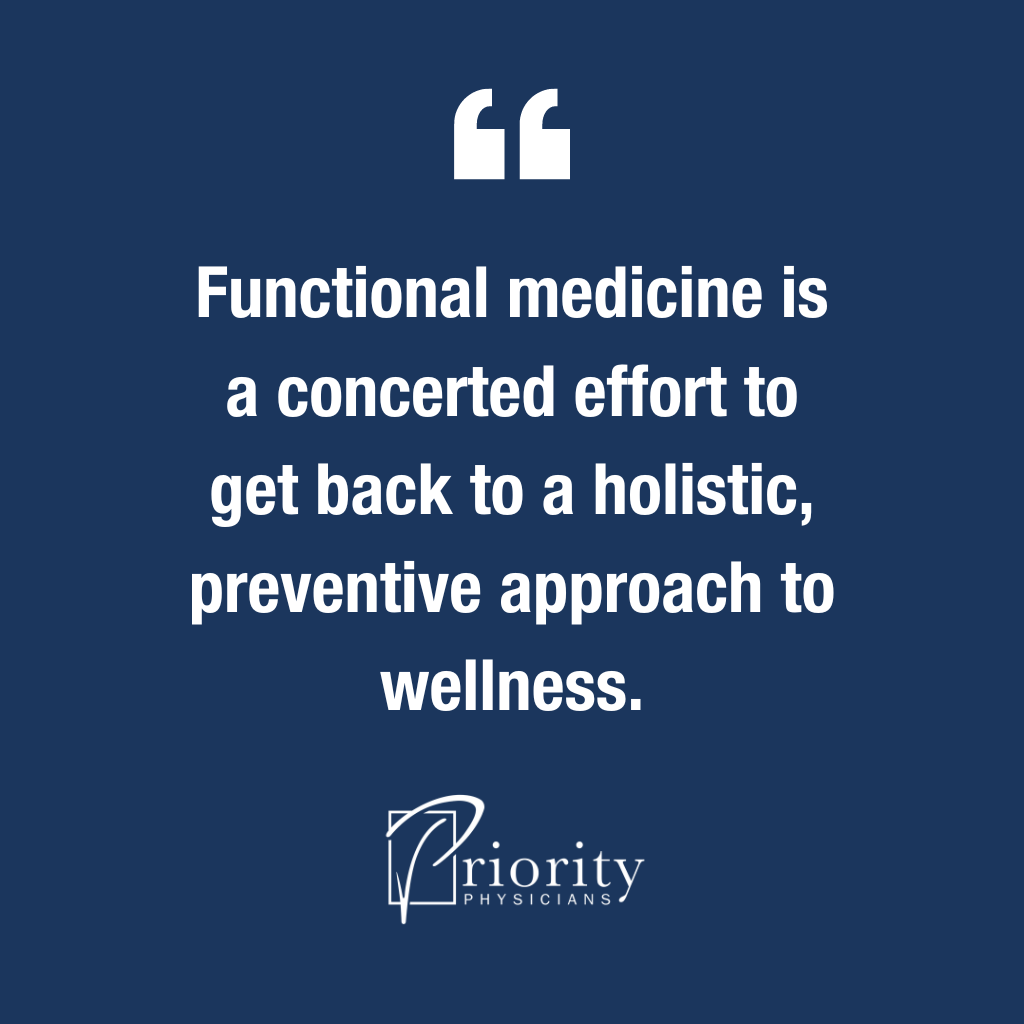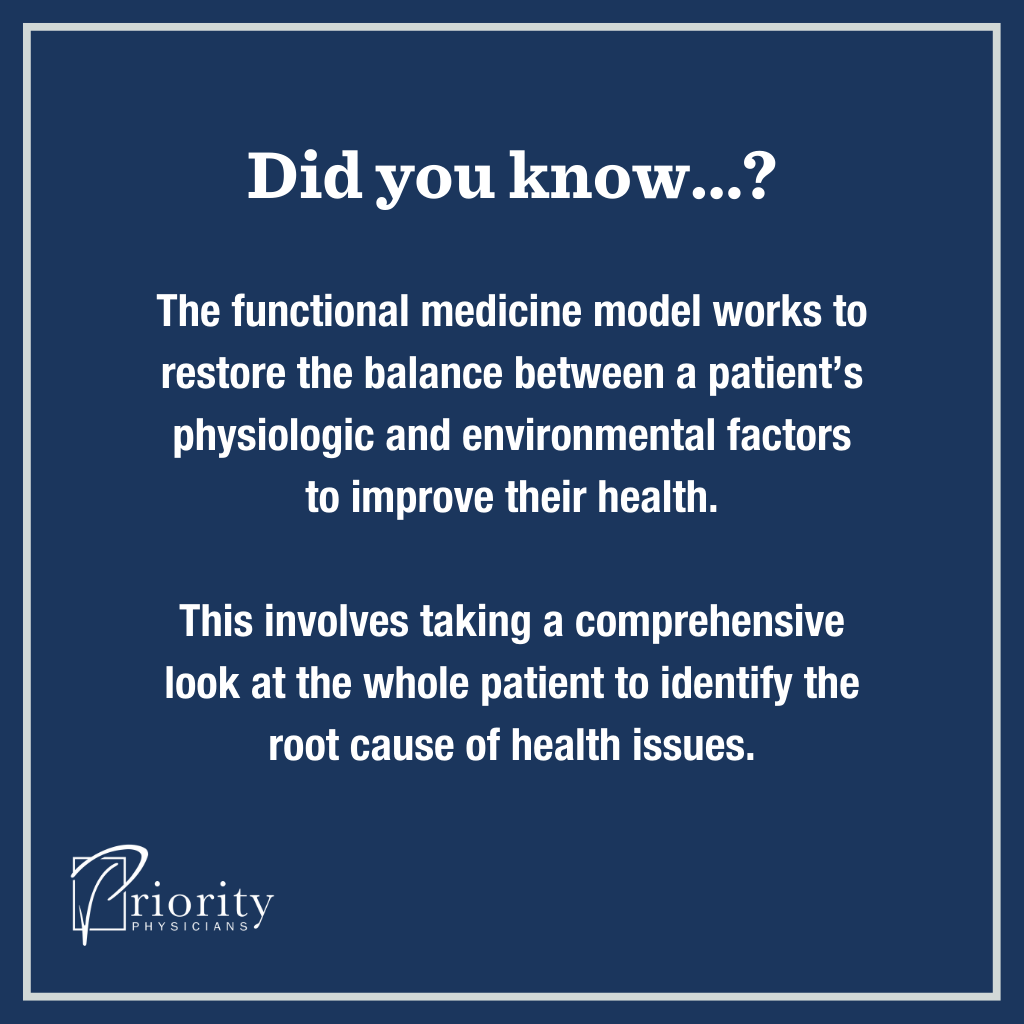What is functional medicine?
Functional medicine is a relatively newer concept in the healthcare world. Some people call it “holistic medicine,” “natural medicine,” or “food as medicine.”
Functional medicine is all of those. It evaluates the interactions of the patient’s systems as a whole rather than looking at specific symptoms in isolation. It takes into account a person’s environment, genetics, nutrition, stressors, and other potential triggers for disease, and attempts to find the deeper root causes at play.
The functional medicine model works to restore the balance between a patient’s physiology and the environment in which they live.
My Interest in the Functional Medicine Model
In my practice, I found that many patients still felt poorly even though their medical concern was well-treated. I was drawn to functional medicine because its main goal is to examine the root cause of disease, and sometimes, fixing the root cause is more than restoring labs to “normal” values or just looking at one aspect of the puzzle.
I also wanted to get a better understanding of how to make specific dietary recommendations to promote healing and wellness. Through my functional medicine training, I know how and when to utilize supplements along the healing journey.
Although my primary practice is based on Western medicine principles and treatments, I often include the fundamentals of functional medicine as I approach the concerns of my patients.
How Is the Functional Medicine Model Different?
In theory, all medicine should be centered around identifying the root cause of a disease. Currently, traditional Western medicine often focuses on treating symptoms of existing disease rather than promoting wellness.
Some of the most important things we manage under the functional medicine model are lifestyle factors. Generally, patients have direct control over their lifestyle decisions, and can see tremendous improvement in their quality of life when they focus on these areas to improve health. Sleep, diet, movement, and mindfulness all have a huge impact on how we feel.
While physicians exclusively practicing Western medicine do address the importance of these lifestyle factors, they often are not explored very deeply due to time constraints. Also, many insurance plans don’t reimburse physicians for these discussions.
Our current healthcare system and insurance models prioritize treating problems rather than preventing them in the first place.
Here at Priority Physicians, we have the time to dive deeply into these lifestyle treatment options with our patients, in addition to getting to know the genetic and environmental influences on their health state.
Functional medicine is a concerted effort to get back to a holistic, preventive approach to wellness.

Misconceptions About the Functional Medicine Model
As helpful as the functional medicine model can be, it shouldn’t be a replacement for the Western medicine model. In fact, we have very strong evidence that many Western treatments and interventions are highly beneficial.
Many alternative approaches to healthcare existed long before our Western model evolved — Chinese herbal medicine, hypnotherapy, homeopathy, acupuncture, etc. Finding a balance among these modalities is what’s important.
Here at Priority Physicians, we help guide patients to find what options work best for their situation with minimal risks. Sometimes the best option is a prescription medication, but sometimes treating an underlying nutritional deficiency is all that’s needed.
Some functional medicine providers don’t prescribe traditional pharmaceuticals at all, but I don’t look at functional medicine as the only solution. I still practice evidence-based, traditional Western medicine, as all the doctors at Priority Physicians do. But through my functional medicine training, I feel comfortable addressing many of the underlying triggers that also may be at play (nutritional deficiencies, gut dysfunction, hormones, etc.).
The functional medicine model doesn’t oversimplify treatment for a condition. It identifies the root causes, the triggers and exposures that led to those imbalances, and then utilizes a variety of lifestyle and supplemental adjustments to lead to improvement over time.
Want More Information?
If you’re interested in the functional medicine model, we recommend you take a balanced approach to your health with a blend of evidence-based practices. While we advocate for a comprehensive and tailored approach to wellness, we don’t want to negate the importance and benefits of Western medicine.
At Priority Physicians, we have the time and resources to counsel our patients on lifestyle changes that are the basis of functional medicine. That’s something the traditional insurance-based model can’t offer. We’re proud to incorporate both cutting-edge advancements in care and holistic wellness into our approach.

What Is the Functional Medicine Model: Final Thoughts
The functional medicine model works to restore the balance between a patient’s physiologic and environmental factors to improve their health.
This involves taking a comprehensive look at the whole patient to identify the root cause of health issues, and taking a holistic, patient-centered approach to health and wellness. It’s a great complement to evidence-based medical therapies, and can provide tailored solutions to common health conditions.
If you’d like to learn more about how functional medicine can help you in your wellness journey, give us a call.

